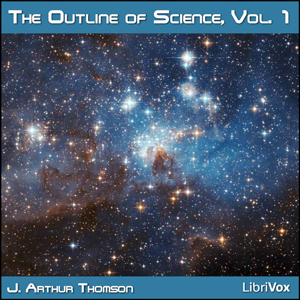
In The Outline of Science, Thomson gives us a window into scientific thinking as it stood in 1922 on the big, the little, and the biological. With straightforward language intended for a general audience, this book covers astronomy from the Solar System to the Milky Way, the submicroscopic makeup of matter from protons and electrons, and the evolution of simple living beings into the varied fauna of the world today. Thomson cites many examples that would have been familiar to his readers of the day and notes where scientific understanding leaves off and conjecture begins. He clearly shows how the accumulation of observation and experiment stacked up to form the body of knowledge reported in the book. For even the scientifically well-versed, there will be interesting nuggets, for investigation into how the world came to be as it was, was both wide and deep.
To a modern listener, what was not known may be as interesting as what was. With the 100-inch Mt. Wilson reflector the largest telescope in the world, the existence of galaxies outside the Milky Way was suspected but not confirmed. Neutrons, soon to become important in the field of nuclear energy and atomic bombs, were as yet unguessed-at, yet the prospect of liberating the immense energy of the atom was already a keen interest. Although the famous Michaelson-Morley experiment had already been seen as disproof of an all-pervading “ether” which facilitated the flow of energy across empty space, scientists still retained ether as a place-holder for properties they could measure but not explain – an approach very similar to the “dark matter” of modern cosmology.
Regardless of your personal sentiments on Darwin’s theory of evolution, Thomson provides well-chosen examples that illustrate why this theory arose. He examines not only the fossil record but the evidences present in modern living beings that the process of evolution is by no means finished, but ongoing.
Even at that time, Thomson worried over the future of energy sources. He contemplated the exhaustion of the coal fields and indeed, the eventual exhaustion of all usable energy in the universe, foreshadowing our concept of entropy.
This book has been consistently among the “Top 100 E-Books” published by Project Gutenberg.
Summary by Mark F. Smith.

Other Audiobook
Audiobook: Spinster Book
A cross between guidebook and social commentary, The Spinster Book gives clever and humorous insights
Audiobook: Dog’s Tale
This short novel of Twain’s, from 1903, is told from the point of view of
Audiobook: Mental and Moral Heredity in Royalty. A Statistical Study in History and Psychology
Frederick Adams Woods examined the biographical records and family trees of the great dynasties of
Audiobook: Bible (KJV) 04: Numbers
The Book of Numbers is the fourth book of the Hebrew Bible, and the fourth
Audiobook: Ὁμήρου Ὀδύσσεια (Ραψῳδία 07) – The Odyssey (Book 07)
Ἡ Ὀδύσσεια τοῦ Ὁμήρου ἐντάσσεται στὰ πλαίσια τῶν ἐργασιῶν πού ξεκίνησα ἐδῶ καὶ μερικὰ χρόνια
Audiobook: Drummer, or, The Haunted House
Lady Truman received word fourteen months ago that her husband, Sir George Truman, has died
Audiobook: Rain (Version 2)
Rain charts the moral disintegration of a missionary attempting to convert a Pacific island prostitute
Audiobook: Intoxicated Ghost And Other Stories
A charming collection of short stories, dealing with ghosts, magic, and other-worldly events that even
Audiobook: Bauerngeselchtes
Adam Karrillon (1853-1938) war Arzt und Schriftsteller. Bekannt wurde er durch seine Heimatromane aus dem
Audiobook: 呐喊 (Call to Arms)
《呐喊》收录了鲁迅1918年至1922年所作短篇小说十四篇,其中包括中国文学史上第一篇白话文小说《狂人日记》,以及《孔乙己》、《阿Q正传》等鲁迅的代表作品。 “Call to Arms” is a collection of short stories Lu Xun published during 1918-1922.
Audiobook: Unprofessional Tales
A collection of stories exploring the psychological and paranormal, some stories bordering on the macabre.
Audiobook: Torah (JPSA) 03: Leviticus
The third book of the Pentateuch – Leviticus. Presented according to weekly parshah. Praised are